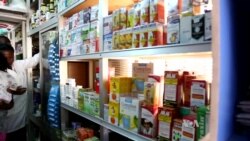Funmi Bola Omotayo works at Jolas Pharmacy in the Nigerian capital, Abuja. She sells what are known in Nigeria as essential medicines - pharmaceutical commodities like pain relievers, anti-malarial treatments, and antibiotics.
But she and other pharmacy retailers are feeling the pinch of the country’s worsening recession. The cost of medicines at her store has gone up 40 percent in the past six months.
She is worried about her customers.
“You can say affordability of drugs is actually life. Your health will not know if you can afford the drugs or not,” Omotayo says. Less than 5 percent of her customers have health insurance to help subsidize the costs. “You need your money to purchase your drugs at the right time to save your life and if you can’t do that I think your health is actually affected.”
Most of the medicines she sells are imported. Public health analysts say less than 30 percent of the medicines available in Nigeria are manufactured locally.
This year, inflation hit a two-decade high, and imported medications have been further hit by a devaluation of Nigeria's currency and increased import tariffs.
Drug costs a concern for decades
But even before the economy slumped this year, medicines were relatively expensive in Nigeria due to a costly supply chain and poor government oversight.
The World Health Organization and the Nigerian Ministry of Health collaborated on cost surveys in 2004 and 2010, finding medicine prices in Nigeria to be several times higher than in many other countries. The 2004 survey found markups up to 900 percent above the manufacturer’s price.
Onyekachi Mbadiwe, a pharmacist and consultant, blames the high prices in part on poor coordination among regulators, importers, sellers, distributors and patients.
“The pharmaceutical market in Nigeria is quite big. So with the players everyone is trying to think of their own self interest, how they can maximize profit because there isn’t the strong regulation from the government,” she says.
The Nigerian government published its first National Medicine Policy in 1990 to cover the pricing, financing, procurement, distribution, regulation, monitoring, evaluation and use of medicine. But the policy is not being fully implemented.
New cost app
Frustration over the high prices prompted a team of young technical experts at Code for Nigeria to develop a computer app to help Nigerians learn more about the cost of medications.
“The tool asks people how much they’re paying for medicine, compares it with the World Health Organization data showing what an average person is paying everywhere else in the world and we display what percentage higher Nigerians are paying,” Temi Adeoye, the lead technologist, tells VOA.
But Mbadiwe says she is concerned because she thinks the app does not provide enough information about what goes into pricing medications.
“The danger I felt is that people can comment. People can tweet the response for these prices and that’s potentially going to be quite dangerous possibly,” she says. “I can imagine someone tweeting, 'Oh I bought Paracetamol at 500 times the markup at X pharmacy. They’re fraudulent, they’re doing all sorts of things,' and this will go on social media and we know how powerful social media can be. So I was just thinking there needs to be something to just support the information that is being given to the client.”
Cost of doing business
The application does not provide information about the supply chain, which some analysts believe is at the root of the problem.
For example, medical warehouses need to be kept at a certain temperature to preserve the quality of the medications, but the Nigerian government does not provide 24-hour electricity. Some areas in the country may experience one hour of electricity a day, other places 10 hours. Millions of Nigerians and businesses, including pharmaceutical companies, buy fuel to power generators or use expensive inverters to store energy, adding to costs.
Another expense is transport in a country with poor roads and a reputation for banditry.
These are all part of what Dr. Nkata Chuku refers to as “system defects” that weaken what he sees as an immature supply chain.
“For each layer that is expensive from the difficult and often expensive custom clearance procedures to the more expensive warehousing to an expensive distribution system, all those are basically added onto to the cost of the drug and transported down to the patient,” Chuku says.
Chuku is a founding partner of Health Systems Consult Limited, which worked with the Nigerian government to streamline the essential medicine procurement process.
Chuku tells VOA, “For things like malaria, which is quite endemic in Nigeria, you have several different programs buying bits, so you can imagine what you’d gain if you had ... one national type procurement system for malaria commodities.”
Chuku worries the high cost of medicine pushes some people to go for cheaper, suboptimal drugs, many of which are fake.
Nigeria's National Agency for Food And Drug Administration and Control along with the Pharmacists Council of Nigeria have approved policies to help combat suboptimal drugs. But it comes to down affordability.
Adeoye hopes the Code for Nigeria “medicine app” will make Nigerians better informed about the cost of their medicines and will encourage them to advocate for policies that will lower prices.





